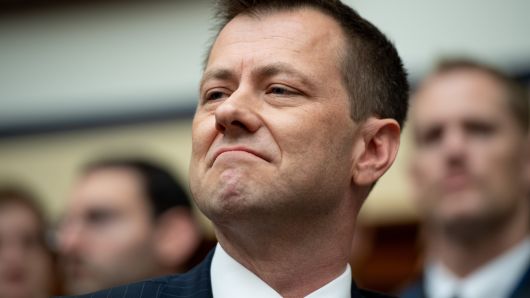Judiciary Chairman Bob Goodlatte, R-Va., presented Strzok with an ultimatum, he could either answer a question about the special counsel investigation into Trump and Russia, or refuse and risk a contempt citation and potential criminal charges.
Strzok, at the direction of FBI legal counsel, refused to answer any questions related to Special Counsel Robert Mueller’s ongoing investigation. It was the first question of the hearing. Strzok was asked how many interviews he conducted during the first week of the Trump-Russia investigation.
The Republican chairman raised his voice and insisted Strzok was legally obligated to provide an answer to Congress. Democrats broke in, accusing the GOP members of badgering the witness. Then, using parliamentary tactics, they made an unsuccessful motion to adjourn the hearing an hour after it began.
Thursday marked the second time Peter Strzok sat before lawmakers. Two weeks ago he was questioned behind closed doors for nearly 11 hours. The Republican chairmen of the committees have yet to release the transcript from the interview.
By the late afternoon Thursday, the witness had provided little new information and frustrations were mounting on both sides of the aisle.
“I think this is a political show trial,” Rep. Gerry Connolly, D-Va. told Sinclair Broadcast Group (SBG). “They’re willing to sacrifice institutional integrity here in Congress for a political goal, and that is to protect Trump from an ongoing criminal investigation.”
Rep. Raja Krishnamoorthi, D-Ill., struggled to make sense of the chairman’s threat to hold the witness in contempt on the first round of questions. “I think that there’s a lot of theatrics going on with this whole hearing,” he noted.
Shaking his head, Rep. Ted Lieu, D-Calif., exclaimed, “It’s a stupid hearing … ‘full of sound and fury, signifying nothing.’”
Republicans were equally frustrated, both with the witness and with their Democratic colleagues.
“They made a mockery of it,” Rep. Louis Gohmert, R-Texas, told Circa.Tweet
Rep. Jim Jordan of Ohio argued the Democrats were providing cover for Strzok “instead of trying to get the answers, get the truth.”
Rep. Thomas Massie, R-Ky., questioned Strzok’s credibility as a witness, telling SBG, “He’s hiding behind a cloak or a veil that I think is all too convenient for him, in terms of refusing to answer certain questions.
Ostensibly, the central issue in the hearing was whether Mr. Strzok’s anti-Trump text messages with Lisa Page, a former FBI lawyer with whom he was having an affair, impacted his work on the FBI’s investigation into Trump campaign and Russia.
Strzok denied “unequivocally and under oath” the allegations of bias, insisting the messages he sent to Page were personal beliefs that did not “enter into the realm” of his work on the Trump or Clinton investigations.
He also stated, repeatedly, that he did not believe his text messages expressed bias. When asked why Mueller removed him from the Trump investigation, he explained it was out of the desire “to avoid even the appearance of any potential bias.”
The lengthy Department of Justice Inspector General report released last month partially supported Strzok’s assertion. The report concluded that Strzok and Page’s communications were “indicative of a biased state of mind,” but did not impact the outcome or judgments made by the FBI and DOJ in the Hillary Clinton email investigation.
Still, the report did little to assuage Republicans’ concerns.
At the height of the presidential campaign and only days after Strzok helped initiate the FBI’s counterintelligence investigation into possible Trump-Russia collusion, Strzok texted Page to assure her that Trump would not become president, saying, “We’ll stop it.”
Asked to explain the meaning of his text, Strzok said the remarks were “off the cuff” and objected to the idea of parsing the words of a text message “like they’re some contract for a car.” He went on to explain the text was sent in the context of Trump insulting a Gold Star family.
“[It was] my presumption, based on that horrible disgusting behavior, that the American population would not elect someone demonstrating that behavior to be president of the United States,” he said.
Those and other statements did little to endear Mr. Strzok to Republicans on the committee. In a pointed opening statement, Strzok insinuated that the members of Congress who convened the hearing were completing the work Russian President Vladimir Putin started in 2016.
“I have the utmost respect for Congress’ oversight role,” he stated, “but I truly believe that today’s hearing is just another victory notch in Putin’s belt and another milestone in our enemies’ campaign to tear America apart.”
After months in the spotlight, the public hearing gave Strzok an opportunity to defend himself against allegations of bias and potential interference in an FBI investigation of President Trump.
Following a tense exchange with House Oversight Chairman Trey Gowdy, R-S.C., Strzok argued it would have been impossible for him to intentionally steer the investigation against President Trump, because of the layers of oversight in every investigative decision.
“The suggestion that I’m in some dark chamber somewhere in the FBI would somehow cast aside all of these procedures, all of these safeguards, and somehow be able to do this is astounding to me. It simply couldn’t happen,” he said.
Strzok continued that the notion that type of behavior is taking place at the FBI “deeply corrodes what the FBI is in American society, the effectiveness of their mission and it is deeply destructive.”
Toward the end of the hearing, it was not clear whether Chairman Goodlatte was going to pursue his earlier threat to hold Peter Strzok in contempt of Congress. Goodlatte told Circa that a decision had not yet been made.
Goodlatte and Gowdy have also threatened to hold Lisa Page in contempt of Congress if she does not respond to a request to appear before Congress. Earlier this week, the two GOP chairmen gave Page until Friday to appear before their committees to either testify publicly or be deposed in a closed-door hearing.






